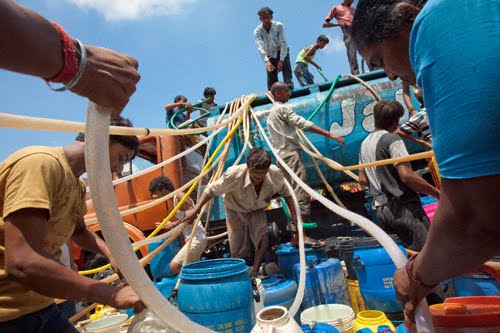"WATER: OUR THIRSTY WORLD" ...An Exhibit at the Annenberg Space for Photography in Association with National Geographic Magazine opened Saturday, March 27, 2010. This exhibition coincides with the release of National Geographic's April 2010 issue on the precarious state of the world's fresh water. The exhibition will run through June 13, 2010 and examines the local and global challenges of our planet's fresh water resources captured by a selection of National Geographic's finest, award-winning photographers. The digital and print images will highlight the significance of fresh water in our lives and how the diminishment of this precious resource is impacting local and worldwide communities. A digital film presentation will expand the visitor experience by offering hundreds more National Geographic images and shared insights from photographers.

Jonas Bendiksen, Magnum Photos
India, 2009
In a parched Delhi slum, men swarm a tanker to siphon precious water. “If you
throw money here,” says a local 16-year-old named Vinay, “no one would have
time to grab it. Water is more important for us.”

Amit Dave, Reuters
India, 2003
Parched Indian villagers mob a vast well in Natwargadh, Gujarat. In this
drought-prone western state, yearly monsoon rains can total less than eight
inches, and summer temperatures have topped 115°F.

Thomas Havisham, Panos
Angola, 2005
Peddling clean well water for 10 cents a bag, this seller will have no problem
finding a buyer in a slum in Luanda, Angola. In 2006 the prevalence of
contaminated water in the city led to one of Africa’s worst cholera epidemics,
with 80,000 Angolans sickened.
Hans Strand, Freelance
Iceland, 2006
Swirling seaward, branches of the bountiful Kolgrima River inscribe the
flatlands near Vatnajökull, Iceland’s largest glacier. Milky tones in the water
are from pale silt; the blue is the reflection of the sky.
John Stanmeyer, VII
India, 2009
India’s holiest river, the Ganges, is scribbled with light from floating oil
lamps during the Ganga Dussehra festival in Haridwar. Hindus near death often
bathe in the river; some are later cremated beside it and have their ashes
scattered in its depths.
Edward Burtynsky
California, USA, 2009
Grass is not an option in Salton City, which survives on water imported from
the Colorado River. With 20 million more residents expected in California by
2050, the state’s quest for water is never over.
Edward Burtynsky
California, USA, 2009
Once the city’s main water source, the Los Angeles River is now a concrete
channel fed by storm drains. City residents rely on water pumped from hundreds
of miles away.
John Stanmeyer, VII
Laos, 2009
A woman launches an offering on the Mekong River, known to Laotians as the
“mother of waters.” The occasion is Boun Pi Mai Lao, the New Year’s
celebration, in April.
Ethiopia 2009
In pursuit of water, the girl with the green ladle routinely walks three hours
to and from her Ethiopian village of Foro. Females here spend most of their
lives fetching water; boys are exempted from the job when they turn seven or
eight.
Lynn Johnson, National Geographic Magazine
Ethiopia, 2009
To this end, NGOs are working to bring clean water to forgotten places, using
technology—like a sand dam to capture rainwater in Ethiopia, where some women
must wrest drops from muddy seeps —while ensuring that locals are involved in
designing, building, and maintaining water projects."
Kitra Cahana, National Geographic Magazine
Nevada, USA, 2009
Shaped like a water drop, this 17-foot-tall steel “meditation space” was made
by Kate Raudenbush for Nevada’s annual Burning Man event. Her goal is “to bring
awareness to the element of water on our planet and its vital importance to our
evolutionary balance.”
Lynn Johnson, National Geographic Magazine
Ethiopia, 2009
In the Foro district of Ethiopia, rocks cover a family latrine, and a stick
acts as a handle. Surveys show that the hygiene-education efforts of WaterAid,
an NGO, are working here: Latrine use has risen from 6 to 25 percent since
December 2007.
Lynn Johnson, National Geographic Magazine
Ethiopia, 2009
Installed by the NGO WaterAid, makeshift wash stations like this one—a water
bottle fastened to the exterior of a grass hut, with soap nearby—are appearing
in Ethiopian villages, where lack of sanitation can be as dire a problem as
water scarcity.
Gerd Ludwig, National Geographic Magazine
California, USA, 2009
In 2007, high levels of bromate—a carcinogen formed when bromide and chlorine
react with sunlight—were found in Los Angeles’s seven-acre, 58-million-gallon
Ivanhoe Reservoir. Today, three million black plastic balls help deflect UV
rays.
Lynn Johnson, National Geographic Magazine
Ethiopia, 2009
In Shekana, Ethiopia, Halike Berisha must fill her jug from a contaminated
reservoir. Access to clean water is not solely a rural problem, but the
challenges of delivering it are most daunting in remote places.
Theo Allofs, Corbis
Australia, 2006
Brown with sediment loosed by seasonal rains, Australia’s King River snakes
through the coastal mudflats of the Kimberley, a remote northwestern region. In
the dry months of May to September, the 76-mile meander lies bare.
Lynn Johnson, National Geographic Magazine
Kenya 2009
Tribal Gabra women in northern Kenya may need five hours a day to lug jerry
cans laden with murky water across the desert. A lingering drought has pushed
this already arid region to a full-blown water crisis.
About the Annenberg Space for Photography
The Annenberg Space for Photography is an entirely new cultural destination dedicated to exhibiting compelling photography. The Space conveys a range of human experiences and serves as an expression of the philanthropic work of the Annenberg Foundation and its Trustees. The intimate environment features state-of-the-art, high-definition digital technology as well as traditional prints by some of the world's most renowned and emerging photographers. The exhibits change three times a year, however the common thread throughout is one of rich emotion. The Photography Space informs and inspires the public by connecting photographers, philanthropy and the human experience through powerful imagery and stories. It is the first solely photographic cultural destination in the Los Angeles area.
















